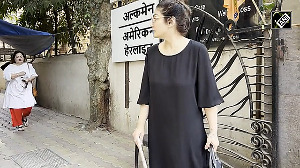Here's a tricky question. Is contemporary Indian music -- read Punjabi pop, Indi-pop, Hind-rock and so on -- going increasingly global, or are global sounds being crooned more and more in India? Think about it.
On the one hand, Pakistani-based artists like Strings, Fuzon and Junoon have found a huge fan following after their releases in India; on the other hand, bands from Denmark, Canada and London are increasingly being heard on the Indian music circuit.
With the Indian music industry having declined to Rs 600 crore (Rs 6 billion) from Rs 1,200 crore (Rs 12 billion) in the 1990s, what is bringing an increasing number of bands from other countries to India?
Why are discos grooving to the beat of Bombay Rockers and Josh? What makes Juggy D such a hit with youngsters? Why are promos of forthcoming films like Kya Kool Hain Hum relying so heavily on the 'item' song sung by Veronica and Jay Sean?
T Suresh, business head, Times Music, a music company that has introduced artists like Juggy D, Trickbaby and Bombay Rockers (a band that the company spotted on audio sampler via the Net) in India, feels that Asian sounds are ruling the global scene.
"There's fusion of R&B, hip-hop, lounge, grunge besides Indian classical and film songs that are increasingly gaining popularity."
But why is it so important to be heard in India? Steve Ager of Trickbaby, a five-member band from London that released its album Hanging Around last year in India says, "As a business model, the world is our market and our band is lucky that India has embraced our music in such a big way." He admits that music channels like MTV India have offered their music good publicity.
Raghav, who has sold nearly one million units worldwide of his album Story Teller, says it was "only natural to come back to India where I originally belong and provide a sample of the music that I'd created." Sounds good, only, there's more of a business model involved here besides a heady dose of patriotism.
Music companies in India find it lucrative to invest a minuscule amount in these bands that want to release their music in India to increase their reach.
An industry source says, "Today, no matter how much a music company invests in an artist, it's a fact that we (music companies) can't recover the costs easily." Which is why, he says, "Bands from abroad that release their cassettes and CDs come to us with the final product."
In other words, nearly Rs 35 lakh (Rs 3.5 million) is already invested by the artist on an album. "Most of these artists also invest in the videos and that also saves us a lot of money," says this industry source, adding, "A music company only needs to invest in the distribution of the cassettes and some publicity campaigns. Calculate this investment and it's anywhere between Rs 10 lakh (Rs1 million) and Rs 12 lakh (Rs 1.2 million)."
Ager confirms, "We have set up our own label, made albums ourselves and then licensed them to music labels (read companies) around the world." This, he says, was done to preserve "complete artistic freedom and to own our music".
Their Indian experience evolved when the band was approached by MTV in India to play for Lycra Style Awards last year, which in turn got them a whopping response from the audience.
He adds, "The actual cost is hard to quantify since we're always upgrading our sound equipment. However, we provide the music and the artwork and then the label pays for the promotion and marketing of our albums."
There are other reasons why India is viable as a music market for these artists. Playback singer Shaan says, "The Punjabi pop sound laced with a hip-hop feel has been there in London for almost a decade now. Naturally, the newer breed of artists will turn to India where this sound is still fresh and new. The bands expand their audience and listeners' base with the help of live shows, especially in Punjab."
Many feel the potential for publicity in India is immense and can get them a chance to showcase their talent in Indian films too. Rob Stuart, founder, 2point9 Pvt Ltd, a company that manages artists like Rishie Rich, Juggy D and Veronica, agrees.
"The song U&I in Hum Tum gave us good mileage and even Dil mera from Kya Kool Hain Hum is getting a good response." The company has tapped nearly 15 artists and is in the process of working on their albums, some of whom will also be released in India.
Canada-based band Josh has been asked to compose music for a crossover film starring Anupam Kher. A member of another leading band from the UK, on condition of anonymity, says, "Even if we have to pay to get a song in an Indian film, we'll happily do it. It's fantastic publicity."
It could also lead to artists endorsing products and brands. While 2point9 is tight-lipped about advertising deals, they confirm that their artists have been asked to endorse sports brands.
In all probability, Juggy D will endorse a range released by Adidas, a leading international sports brand. Thomas and Naf, members of Denmark-based band Bombay Rockers that released their self-titled album last year through Times Music agree.
"We had an offer for a Ram Gopal Varma movie but felt our timing for a Bollywood movie wasn't right at that time. But we're interested now. After all, a Bollywood film is a great promotion tool in India and its market is still much bigger than the non-film music category."
Ager confirms, "Ironically, it wasn't until we achieved a certain level of success in India that some of the UK media started showing interest in us." He says, "Our band Trickbaby could also connect with the audience better when our song, Hanging around, found a release in Nagesh Kukunoor's film Hyderabad Blues 2.
According to Savio D' Souza, secretary general, Indian Music Industry, "The Indian music industry is working very closely with the markets in the US and I've been having positive meetings with the US Trade & Investments Board to allow maximum interaction and a free flow of artists performing in India and Indian artists performing abroad."
He says, "IMI is against any kinds of rules and regulations and we welcome all artists to come and be a part of the Indian music industry."
Not surprisingly, artists are pouring in from all over the world to find a firm foothold in the Indian market.
According to Shivaji Gupta, VP, marketing, Universal Music, "Youngsters in India are responding positively to the sounds offered by these artists coming from abroad." Shaan sums it up: "Listening to Punjabi music may not be termed 'cool' but listening to the same music served with an international feel certainly is."






 © 2025
© 2025